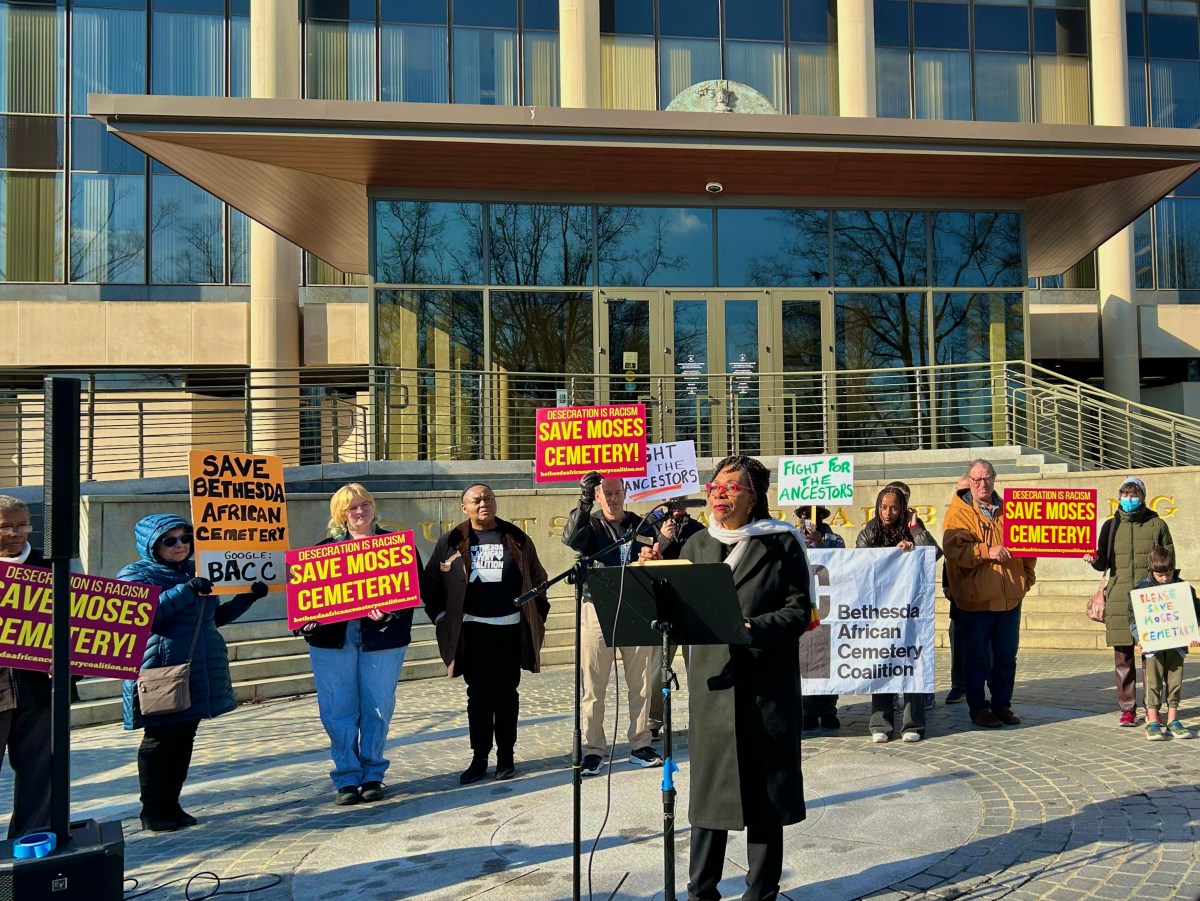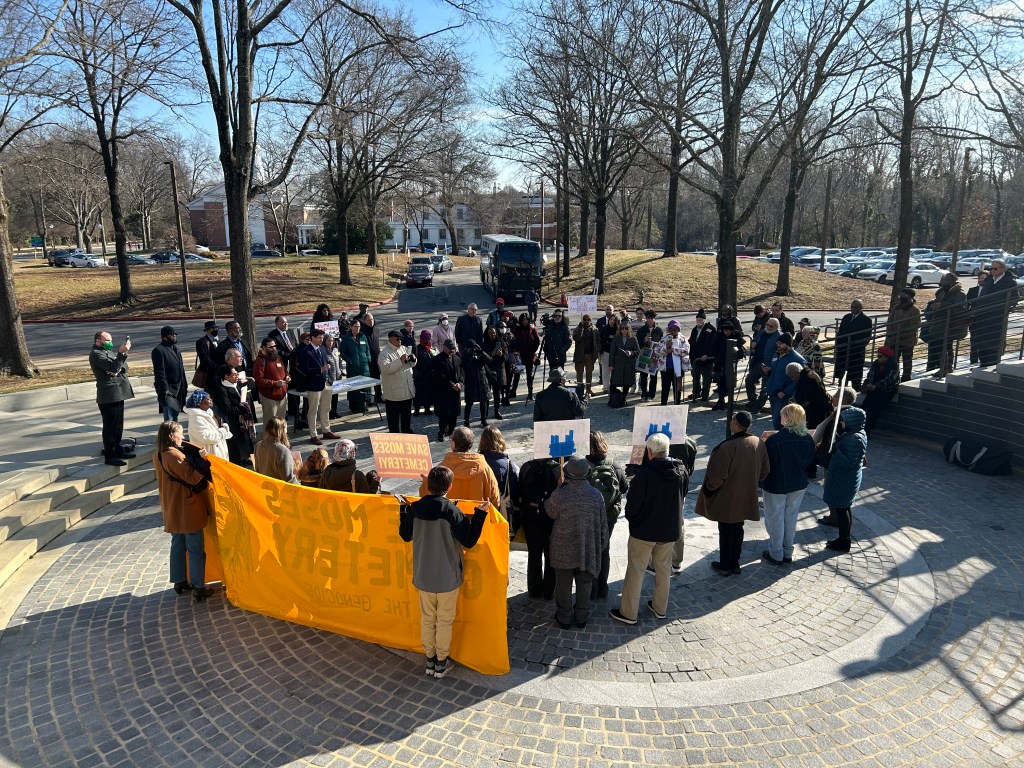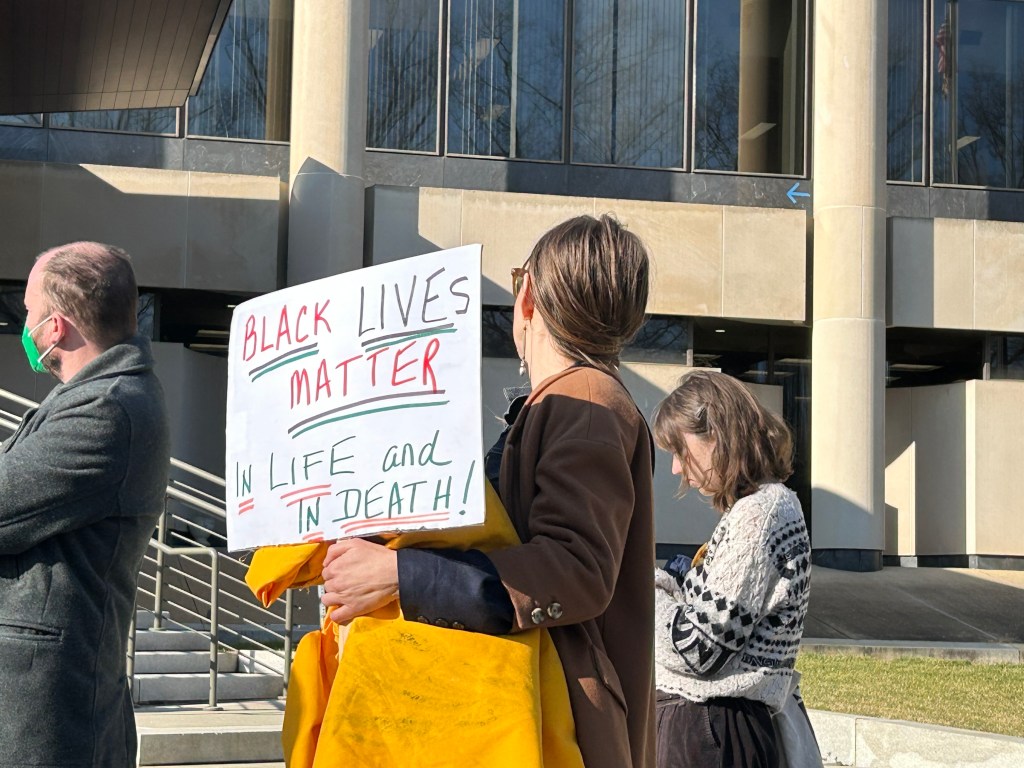“Black bodies are not for sale!”
This phrase rang out repeatedly outside the Maryland Supreme Court in Annapolis after the justices heard arguments Monday from the Bethesda African Cemetery Coalition (BACC) and Montgomery County’s House Opportunities Commission (HOC) over a cemetery beneath an apartment complex parking lot.
This case, which began in 2021, centers on whether the HOC can sell Westwood Tower Apartments in Bethesda to a private developer, even though the remains of 200 Black people from different generations are buried underneath the parking lot.
BACC calls it the Moses Macedonia Cemetery, which is located just off River Road. Over the past couple of years and in court on Monday, BACC argued that HOC needs court approval to sell the land since it consists of burial grounds.
The crux of the debate, and a point the justices focused on, is the interpretation of a Maryland statute, specifically: if an entity needs to receive court approval for the sale of property containing burial grounds or if it’s a courtesy.
In the 1960s, the cemetery site was paved over to be used as the parking lot for Westwood Tower Apartments, according to BACC attorney Steve Lieberman, and the burial ground is located on parcel 175 on Westbard Avenue.
HOC, which provides housing for low- and moderate-income families in the county, acquired the apartment building in 2018, according to HOC’s website. In 2021, HOC planned to sell the property to a developer, Charger Ventures, for $51 million, according to HOC’s website. BACC filed a lawsuit to block the sale in August 2021.
In October 2021, Montgomery County Circuit Court Judge Karla Smith granted a preliminary injunction against the sale. In November 2021, Charger pulled out of the sale because of the litigation.
Then, in June 2023, the Appellate Court of Maryland overturned the Circuit Court’s ruling, saying that HOC does not need to seek court approval before selling the Bethesda property.
In court on Monday, Lieberman argued that protecting the cemetery is in the public interest, so the statute should be interpreted so that HOC needs to gain court approval. Justice Brynja McDivitt Booth asked him to elaborate on this.
“The United States Supreme Court characterized…issues concerning burial plots, burial grounds and the treatment of dead bodies, as a matter that involves public nuisance and the interests of others, not just private parties,” Lieberman said. “Our society and the courts should protect the people that are dead.”
HOC attorney Frederick Douglas argued that the desecration of Black bodies happened decades ago, and the case should have been addressed then.
Justice Steven B. Gould asked him if this means the current statute cannot be used to block the sale of the property today, and Douglas said yes.
“This statute cannot be used to block the change of title,” Douglas said.
However, Douglas, and HOC as a whole, said that they do not wish to take away the rights of the Black bodies buried.
“HOC acknowledges the significance of the African-American history affiliated with this site and has no plans to disturb the land nor infringe upon the rights of its descendants. HOC will continue to respect and honor this legacy in the community,” HOC’s President/Executive Director Chelsea Andrews said in an email statement Monday.
Douglas declined to comment after the proceedings on Monday.
At a press conference after the proceedings, Lieberman emphasized that this case is important because it is not an isolated incident.
“This same issue is coming up hundreds of places around the United States, and the whole country is watching this court and what it does,” Lieberman said.
Lieberman added that this case is just the beginning of BACC’s mission for justice. First, they want to stop the sale of the land containing burial grounds, and if they win, their next case is to get rid of the parking lot and honor the land in a way that suits the community.
“The next step, once we stop HOC, is to make them remove the parking lot and to listen to the community as to what the community wants, and then to treat those 200 bodies with the dignity and respect that every member of our society deserves,” Lieberman said.
BACC President Marsha Coleman-Adebayo led chants with her coalition and thanked everyone who helped the organization advance its mission.
“We’ve come to the Maryland Supreme Court to emphatically state that Black bodies are not for sale,” Coleman-Adebayo said.






